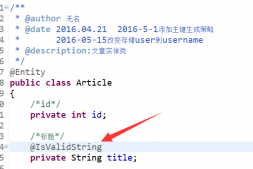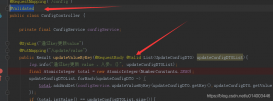AtomicLongArray介绍和函数列表
AtomicLongArray函数列表
|
1
2
3
4
5
6
7
8
9
10
11
12
13
14
15
16
17
18
19
20
21
22
23
24
25
26
27
28
29
30
31
32
|
// 创建给定长度的新 AtomicLongArray。AtomicLongArray(int length)// 创建与给定数组具有相同长度的新 AtomicLongArray,并从给定数组复制其所有元素。AtomicLongArray(long[] array)// 以原子方式将给定值添加到索引 i 的元素。long addAndGet(int i, long delta)// 如果当前值 == 预期值,则以原子方式将该值设置为给定的更新值。boolean compareAndSet(int i, long expect, long update)// 以原子方式将索引 i 的元素减1。long decrementAndGet(int i)// 获取位置 i 的当前值。long get(int i)// 以原子方式将给定值与索引 i 的元素相加。long getAndAdd(int i, long delta)// 以原子方式将索引 i 的元素减 1。long getAndDecrement(int i)// 以原子方式将索引 i 的元素加 1。long getAndIncrement(int i)// 以原子方式将位置 i 的元素设置为给定值,并返回旧值。long getAndSet(int i, long newValue)// 以原子方式将索引 i 的元素加1。long incrementAndGet(int i)// 最终将位置 i 的元素设置为给定值。void lazySet(int i, long newValue)// 返回该数组的长度。int length()// 将位置 i 的元素设置为给定值。void set(int i, long newValue)// 返回数组当前值的字符串表示形式。String toString()// 如果当前值 == 预期值,则以原子方式将该值设置为给定的更新值。boolean weakCompareAndSet(int i, long expect, long update) |
AtomicLongArray源码分析(基于JDK1.7.0_40)
AtomicLongArray的完整源码
|
1
2
3
4
5
6
7
8
9
10
11
12
13
14
15
16
17
18
19
20
21
22
23
24
25
26
27
28
29
30
31
32
33
34
35
36
37
38
39
40
41
42
43
44
45
46
47
48
49
50
51
52
53
54
55
56
57
58
59
60
61
62
63
64
65
66
67
68
69
70
71
72
73
74
75
76
77
78
79
80
81
82
83
84
85
86
87
88
89
90
91
92
93
94
95
96
97
98
99
100
101
102
103
104
105
106
107
108
109
110
111
112
113
114
115
116
117
118
119
120
121
122
123
124
125
126
127
128
129
130
131
132
133
134
135
136
137
138
139
140
141
142
143
144
145
146
147
148
149
150
151
152
153
154
155
156
157
158
159
160
161
162
163
164
165
166
167
168
169
170
171
172
173
174
175
176
177
178
179
180
181
182
183
184
185
186
187
188
189
190
191
192
193
194
195
196
197
198
199
200
201
202
203
204
205
206
207
208
209
210
211
212
213
214
215
216
217
218
219
220
221
222
223
224
225
226
227
228
229
230
231
232
233
234
235
236
237
238
239
240
241
242
243
244
245
246
247
248
249
250
251
252
253
254
255
|
/* * ORACLE PROPRIETARY/CONFIDENTIAL. Use is subject to license terms. * * * * * * * * * * * * * * * * * * * * *//* * * * * * * Written by Doug Lea with assistance from members of JCP JSR- * Expert Group and released to the public domain, as explained at * http://creativecommons.org/publicdomain/zero/./ */package java.util.concurrent.atomic;import sun.misc.Unsafe;import java.util.*;/** * A {@code long} array in which elements may be updated atomically. * See the {@link java.util.concurrent.atomic} package specification * for description of the properties of atomic variables. * @since . * @author Doug Lea */public class AtomicLongArray implements java.io.Serializable { private static final long serialVersionUID = -2308431214976778248L; private static final Unsafe unsafe = Unsafe.getUnsafe(); private static final int base = unsafe.arrayBaseOffset(long[].class); private static final int shift; private final long[] array; static { int scale = unsafe.arrayIndexScale(long[].class); if ((scale & (scale - )) != ) throw new Error("data type scale not a power of two"); shift = - Integer.numberOfLeadingZeros(scale); } private long checkedByteOffset(int i) { if (i < || i >= array.length) throw new IndexOutOfBoundsException("index " + i); return byteOffset(i); } private static long byteOffset(int i) { return ((long) i << shift) + base; } /** * Creates a new AtomicLongArray of the given length, with all * elements initially zero. * * @param length the length of the array */ public AtomicLongArray(int length) { array = new long[length]; } /** * Creates a new AtomicLongArray with the same length as, and * all elements copied from, the given array. * * @param array the array to copy elements from * @throws NullPointerException if array is null */ public AtomicLongArray(long[] array) { // Visibility guaranteed by final field guarantees this.array = array.clone(); } /** * Returns the length of the array. * * @return the length of the array */ public final int length() { return array.length; } /** * Gets the current value at position {@code i}. * * @param i the index * @return the current value */ public final long get(int i) { return getRaw(checkedByteOffset(i)); } private long getRaw(long offset) { return unsafe.getLongVolatile(array, offset); } /** * Sets the element at position {@code i} to the given value. * * @param i the index * @param newValue the new value */ public final void set(int i, long newValue) { unsafe.putLongVolatile(array, checkedByteOffset(i), newValue); } /** * Eventually sets the element at position {@code i} to the given value. * * @param i the index * @param newValue the new value * @since 1.6 */ public final void lazySet(int i, long newValue) { unsafe.putOrderedLong(array, checkedByteOffset(i), newValue); } /** * Atomically sets the element at position {@code i} to the given value * and returns the old value. * * @param i the index * @param newValue the new value * @return the previous value */ public final long getAndSet(int i, long newValue) { long offset = checkedByteOffset(i); while (true) { long current = getRaw(offset); if (compareAndSetRaw(offset, current, newValue)) return current; } } /** * Atomically sets the element at position {@code i} to the given * updated value if the current value {@code ==} the expected value. * * @param i the index * @param expect the expected value * @param update the new value * @return true if successful. False return indicates that * the actual value was not equal to the expected value. */ public final boolean compareAndSet(int i, long expect, long update) { return compareAndSetRaw(checkedByteOffset(i), expect, update); } private boolean compareAndSetRaw(long offset, long expect, long update) { return unsafe.compareAndSwapLong(array, offset, expect, update); } /** * Atomically sets the element at position {@code i} to the given * updated value if the current value {@code ==} the expected value. * * <p>May <a href="package-summary.html#Spurious" rel="external nofollow" >fail spuriously</a> * and does not provide ordering guarantees, so is only rarely an * appropriate alternative to {@code compareAndSet}. * * @param i the index * @param expect the expected value * @param update the new value * @return true if successful. */ public final boolean weakCompareAndSet(int i, long expect, long update) { return compareAndSet(i, expect, update); } /** * Atomically increments by one the element at index {@code i}. * * @param i the index * @return the previous value */ public final long getAndIncrement(int i) { return getAndAdd(i, 1); } /** * Atomically decrements by one the element at index {@code i}. * * @param i the index * @return the previous value */ public final long getAndDecrement(int i) { return getAndAdd(i, -1); } /** * Atomically adds the given value to the element at index {@code i}. * * @param i the index * @param delta the value to add * @return the previous value */ public final long getAndAdd(int i, long delta) { long offset = checkedByteOffset(i); while (true) { long current = getRaw(offset); if (compareAndSetRaw(offset, current, current + delta)) return current; } } /** * Atomically increments by one the element at index {@code i}. * * @param i the index * @return the updated value */ public final long incrementAndGet(int i) { return addAndGet(i, 1); } /** * Atomically decrements by one the element at index {@code i}. * * @param i the index * @return the updated value */ public final long decrementAndGet(int i) { return addAndGet(i, -1); } /** * Atomically adds the given value to the element at index {@code i}. * * @param i the index * @param delta the value to add * @return the updated value */ public long addAndGet(int i, long delta) { long offset = checkedByteOffset(i); while (true) { long current = getRaw(offset); long next = current + delta; if (compareAndSetRaw(offset, current, next)) return next; } } /** * Returns the String representation of the current values of array. * @return the String representation of the current values of array */ public String toString() { int iMax = array.length - 1; if (iMax == -1) return "[]"; StringBuilder b = new StringBuilder(); b.append('['); for (int i = 0; ; i++) { b.append(getRaw(byteOffset(i))); if (i == iMax) return b.append(']').toString(); b.append(',').append(' '); } }} |
AtomicLongArray的代码很简单,下面仅以incrementAndGet()为例,对AtomicLong的原理进行说明。
incrementAndGet()源码如下:
|
1
2
3
|
public final long incrementAndGet(int i) { return addAndGet(i, 1);} |
说明:incrementAndGet()的作用是以原子方式将long数组的索引 i 的元素加1,并返回加1之后的值。
addAndGet()源码如下:
|
1
2
3
4
5
6
7
8
9
10
11
12
13
|
public long addAndGet(int i, long delta) { // 检查数组是否越界 long offset = checkedByteOffset(i); while (true) { // 获取long型数组的索引 offset 的原始值 long current = getRaw(offset); // 修改long型值 long next = current + delta; // 通过CAS更新long型数组的索引 offset的值。 if (compareAndSetRaw(offset, current, next)) return next; }} |
说明:addAndGet()首先检查数组是否越界。如果没有越界的话,则先获取数组索引i的值;然后通过CAS函数更新i的值。
getRaw()源码如下:
|
1
2
3
|
private long getRaw(long offset) { return unsafe.getLongVolatile(array, offset);} |
说明:unsafe是通过Unsafe.getUnsafe()返回的一个Unsafe对象。通过Unsafe的CAS函数对long型数组的元素进行原子操作。如compareAndSetRaw()就是调用Unsafe的CAS函数,它的源码如下:
|
1
2
3
|
private boolean compareAndSetRaw(long offset, long expect, long update) { return unsafe.compareAndSwapLong(array, offset, expect, update);} |
AtomicLongArray示例
|
1
2
3
4
5
6
7
8
9
10
11
12
13
14
15
16
17
18
19
20
|
// LongArrayTest.java的源码import java.util.concurrent.atomic.AtomicLongArray;public class LongArrayTest { public static void main(String[] args){ // 新建AtomicLongArray对象 long[] arrLong = new long[] {10, 20, 30, 40, 50}; AtomicLongArray ala = new AtomicLongArray(arrLong); ala.set(0, 100); for (int i=0, len=ala.length(); i<len; i++) System.out.printf("get(%d) : %s\n", i, ala.get(i)); System.out.printf("%20s : %s\n", "getAndDecrement(0)", ala.getAndDecrement(0)); System.out.printf("%20s : %s\n", "decrementAndGet(1)", ala.decrementAndGet(1)); System.out.printf("%20s : %s\n", "getAndIncrement(2)", ala.getAndIncrement(2)); System.out.printf("%20s : %s\n", "incrementAndGet(3)", ala.incrementAndGet(3)); System.out.printf("%20s : %s\n", "addAndGet(100)", ala.addAndGet(0, 100)); System.out.printf("%20s : %s\n", "getAndAdd(100)", ala.getAndAdd(1, 100)); System.out.printf("%20s : %s\n", "compareAndSet()", ala.compareAndSet(2, 31, 1000)); System.out.printf("%20s : %s\n", "get(2)", ala.get(2)); }} |
运行结果:
|
1
2
3
4
5
6
7
8
9
10
11
12
13
|
get(0) : 100get(1) : 20get(2) : 30get(3) : 40get(4) : 50 getAndDecrement(0) : 100 decrementAndGet(1) : 19 getAndIncrement(2) : 30 incrementAndGet(3) : 41 addAndGet(100) : 199 getAndAdd(100) : 19 compareAndSet() : true get(2) : 1000 |
以上所述是小编给大家介绍的Java concurrency之AtomicLongArray原子类,希望对大家有所帮助,如果大家有任何疑问请给我留言,小编会及时回复大家的。在此也非常感谢大家对服务器之家网站的支持!















